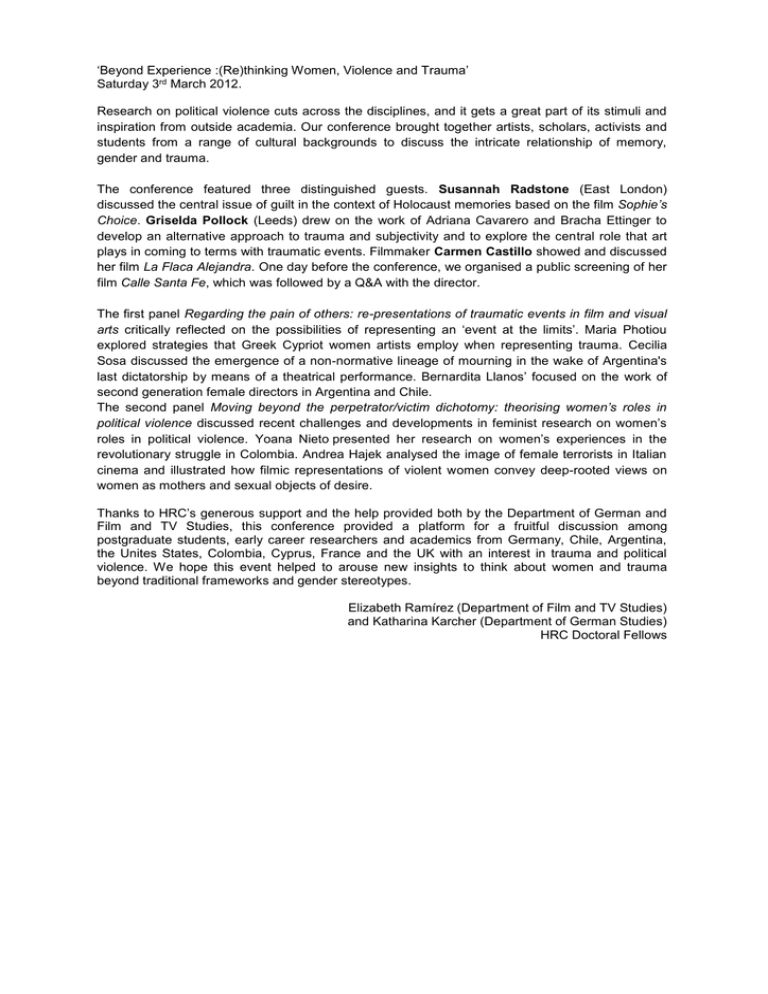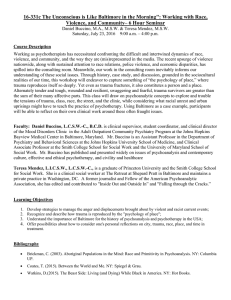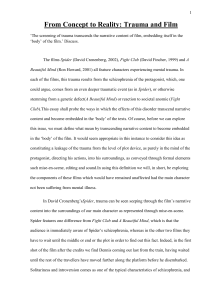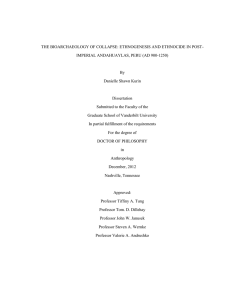‘Beyond Experience :(Re)thinking Women, Violence and Trauma’ Saturday 3 March 2012.
advertisement

‘Beyond Experience :(Re)thinking Women, Violence and Trauma’ Saturday 3rd March 2012. Research on political violence cuts across the disciplines, and it gets a great part of its stimuli and inspiration from outside academia. Our conference brought together artists, scholars, activists and students from a range of cultural backgrounds to discuss the intricate relationship of memory, gender and trauma. The conference featured three distinguished guests. Susannah Radstone (East London) discussed the central issue of guilt in the context of Holocaust memories based on the film Sophie’s Choice. Griselda Pollock (Leeds) drew on the work of Adriana Cavarero and Bracha Ettinger to develop an alternative approach to trauma and subjectivity and to explore the central role that art plays in coming to terms with traumatic events. Filmmaker Carmen Castillo showed and discussed her film La Flaca Alejandra. One day before the conference, we organised a public screening of her film Calle Santa Fe, which was followed by a Q&A with the director. The first panel Regarding the pain of others: re-presentations of traumatic events in film and visual arts critically reflected on the possibilities of representing an ‘event at the limits’. Maria Photiou explored strategies that Greek Cypriot women artists employ when representing trauma. Cecilia Sosa discussed the emergence of a non-normative lineage of mourning in the wake of Argentina's last dictatorship by means of a theatrical performance. Bernardita Llanos’ focused on the work of second generation female directors in Argentina and Chile. The second panel Moving beyond the perpetrator/victim dichotomy: theorising women’s roles in political violence discussed recent challenges and developments in feminist research on women’s roles in political violence. Yoana Nieto presented her research on women’s experiences in the revolutionary struggle in Colombia. Andrea Hajek analysed the image of female terrorists in Italian cinema and illustrated how filmic representations of violent women convey deep-rooted views on women as mothers and sexual objects of desire. Thanks to HRC’s generous support and the help provided both by the Department of German and Film and TV Studies, this conference provided a platform for a fruitful discussion among postgraduate students, early career researchers and academics from Germany, Chile, Argentina, the Unites States, Colombia, Cyprus, France and the UK with an interest in trauma and political violence. We hope this event helped to arouse new insights to think about women and trauma beyond traditional frameworks and gender stereotypes. Elizabeth Ramírez (Department of Film and TV Studies) and Katharina Karcher (Department of German Studies) HRC Doctoral Fellows






